
Tammany Hall, also known as the Society of St. Tammany, the Sons of St. Tammany, or the Columbian Order, was a New York City political organization founded in 1786 and incorporated on May 12, 1789, as the Tammany Society. It was the main local political machine of the Democratic Party, and played a major role in controlling New York City and New York State politics and helping immigrants, most notably the Irish, rise in American politics from the 1790s to the 1960s. It typically controlled Democratic Party nominations and political patronage in Manhattan after the mayoral victory of Fernando Wood in 1854, and used its patronage resources to build a loyal, well-rewarded core of district and precinct leaders; after 1850 the great majority were Irish Catholics.

Martin Henry Glynn was an American politician. He was the 40th Governor of New York from 1913 to 1914, the first Irish American Roman Catholic head of government of what was then the most populated state of the United States.
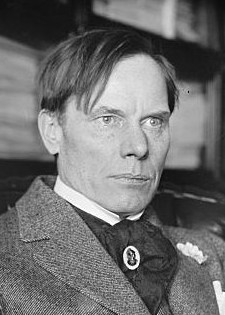
William Sulzer was an American lawyer and politician, nicknamed Plain Bill Sulzer. He was the 39th Governor of New York and a long-serving congressman from the same state. He was the first and so far only New York governor to be impeached. He broke with his sponsors at Tammany Hall, and they produced convincing evidence that Sulzer had falsified his sworn statement of campaign expenditures.

Charles Francis "Silent Charlie" Murphy, also known as Boss Murphy, was an American political figure. He was also the longest-serving head of New York City's Tammany Hall, a position he served from 1902 to 1924. Murphy was responsible for transforming Tammany Hall's image from one of corruption to respectability as well as extending Tammany Hall's political influence to the national level. Known as a reticent politician and a first-rate political chess master, Murphy would be responsible for the election of three mayors of New York City, three governors of New York State, and two US senators, even though he was never listed as a leader of Tammany Hall.
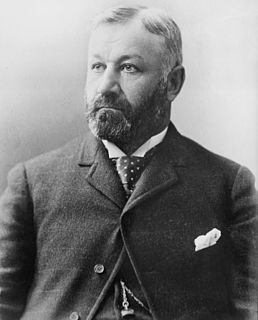
Richard Welstead Croker, known as "Boss Croker," was an American politician who was a leader of New York City's Tammany Hall and a political boss.

Abram Stevens Hewitt was an American teacher, lawyer, an iron manufacturer, chairman of the Democratic National Committee from 1876 to 1877, U.S. Congressman, and a mayor of New York City. He was the son-in-law of Peter Cooper (1791–1883), an industrialist, inventor and philanthropist. He is best known for his work with the Cooper Union, which he aided Peter Cooper in founding in 1859, and for planning the financing and construction of the first subway line of the New York City Subway, for which he is considered the "Father of the New York City Subway System".

Thomas Francis Gilroy was the 89th mayor of New York City from 1893 to 1894.
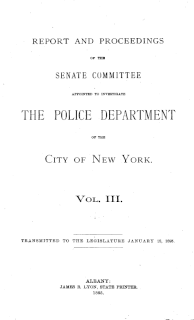
Lexow Committee was a major New York State Senate probe into police corruption in New York City. The Lexow Committee inquiry, which took its name from the committee's chairman, State Senator Clarence Lexow, was the widest-ranging of several such commissions empaneled during the 19th century. The testimony collected during its hearings ran to over 10,000 pages and the resultant scandal played a major part in the defeat of Tammany Hall in the elections of 1894 and the election of the reform administration of Mayor William L. Strong. The investigations were initiated by pressure from Charles Henry Parkhurst.
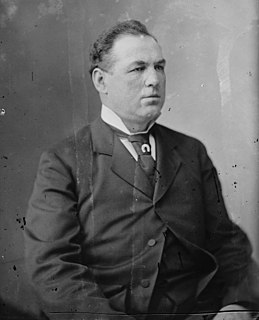
James O'Brien was a U.S. Representative from New York from 1879 to 1881.

James Jay Coogan was the borough president of Manhattan, New York from 1899 to 1901, and a successful merchant and real estate manager.

John Kelly of New York City, known as "Honest John", was a boss of Tammany Hall and a U.S. Representative from New York from 1855 to 1858. The title "Honest" was given to him during his years as New York City Sheriff and was more ironic than truthful.
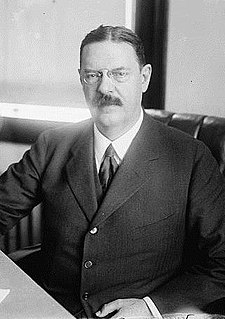
Lewis Nixon was a naval architect, shipbuilding executive, public servant, and political activist. He designed the United States' first modern battleships, and supervised the construction of its first modern submarines, all before his 40th birthday. He was briefly the leader of Tammany Hall. He started an ill-fated effort to run seven major American shipyards under common ownership as the United States Shipbuilding Company, and he was the chair of the New York City commission building the Williamsburg Bridge.

Hugh John Grant served as the 88th mayor of New York City for two terms from 1889 to 1892. He remains the youngest mayor in the city's history. He is also one of the youngest mayors of a major United States city and the second of the Roman Catholic mayors of New York City.

Nicholas J. Hayes, also known as Nick Hayes, was a politician from New York City and one of the powers of the Democratic Party's Tammany Hall political machine for 30 years. His political power base was the 28th Assembly District in lower East Harlem. He served as Fire Commissioner of New York City two times.

John Jay Scannell was a Tammany Hall politician who was the leader of the Eleventh Assembly District. He was appointed the first New York City Fire Commissioner of the new consolidated New York City.
The Manhattan Railway Company was an elevated railway company in Manhattan and the Bronx, New York City, United States. It operated four lines: the Second Avenue Line, Third Avenue Line, Sixth Avenue Line, and Ninth Avenue Line.
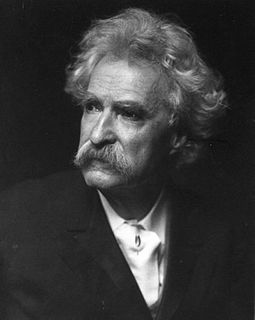
Samuel Langhorne Clemens, well known by his pen name Mark Twain, was an American author and humorist. Twain is noted for his novels Adventures of Huckleberry Finn (1884), which has been called "the Great American Novel," and The Adventures of Tom Sawyer (1876). He also wrote poetry, short stories, essays, and non-fiction.

Edward Morse Shepard was an American lawyer and politician from New York.
Alfred Henry Lewis was an American investigative journalist, lawyer, novelist, editor, and short story writer, who sometimes published under the pseudonym Dan Quin.
The Committee of Seventy was a committee of 70 citizens of New York City, formed in 1871 and under the lead of Samuel J. Tilden, which conducted an investigation and prosecution of misuse of government office by William M. Tweed.
















